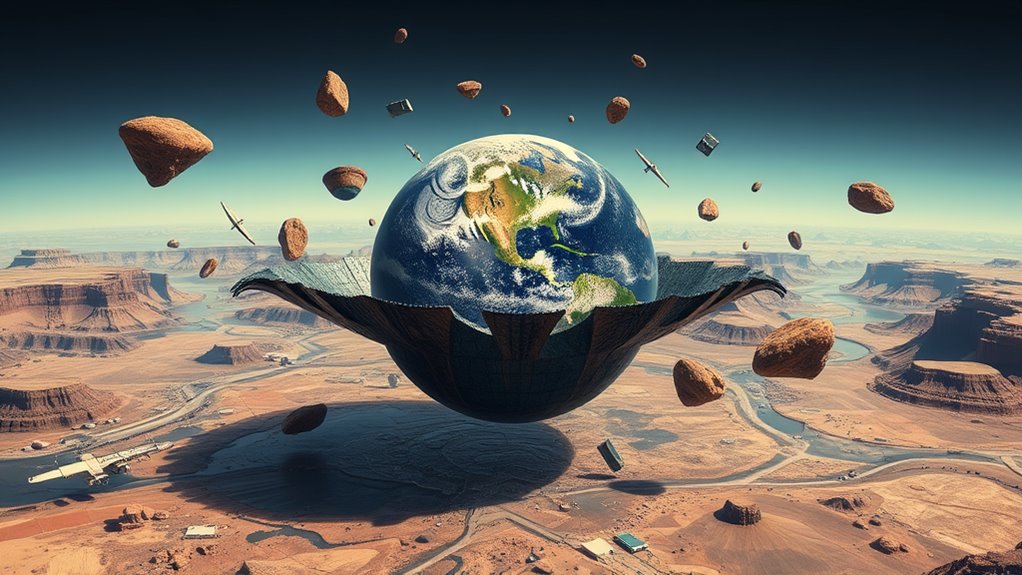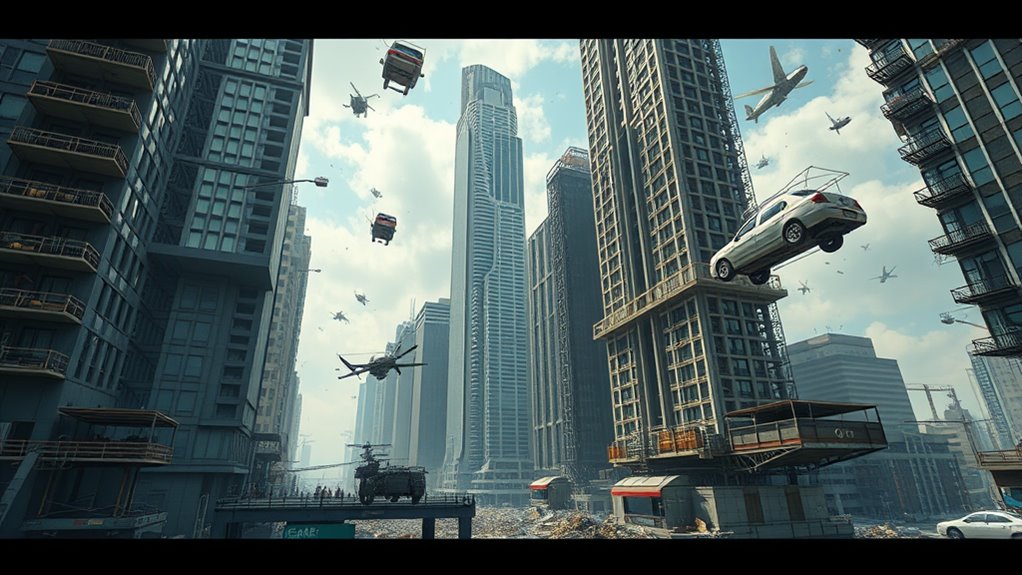If gravity suddenly disappeared, everything familiar would fall apart. Buildings would collapse under their own weight, and roads would crumble. Rivers and oceans would float away, leaving the planet barren and lifeless. You'd struggle to breathe as the atmosphere dissipates, causing pressure drops that could harm you physically. Daily life would become a chaotic challenge, with muscle and bone deterioration affecting your health. Transport and communication systems would fail, making survival a formidable task. As humanity grapples with these extreme changes, you'll find fascinating insights into how we might adapt to a gravity-free world.
Essential Insights
- Earth's crust would detach, causing catastrophic land transformation and structural collapse of buildings and infrastructure.
- The atmosphere would dissipate into space, leading to a rapid drop in air pressure and uninhabitable conditions.
- Water bodies like lakes and oceans would float off into space, resulting in complete water loss and drastic landscape changes.
- Human health would deteriorate due to muscle atrophy, bone density loss, and severe physiological and psychological challenges.
- Infrastructure would fail without gravity, requiring a complete rethinking of transportation, manufacturing, and essential services for survival.
Effects on Earth's Surface

If gravity suddenly disappeared, the effects on Earth's surface would be catastrophic. You'd witness a dramatic land transformation as the Earth's crust and tectonic plates lost their gravitational anchors. Mountains, rocks, and entire landscapes would break apart and float away, leaving behind a chaotic expanse of disintegrating land.
With no gravitational force holding everything in place, the integrity of solid structures would collapse. Buildings, roads, and bridges would crumble under their own weight, while any unanchored object would float into space.
The geological instability would be unprecedented. Volcanic activity, which relies on gravitational forces to keep magma contained, would be disrupted. You wouldn't just see eruptions; you'd experience the complete disintegration of geological formations. This would lead to massive geological upheavals, further destabilizing the Earth's crust.
Rivers, lakes, and oceans would lose their gravitational pull, causing water to rise off the surface and eventually drift into space. Marine ecosystems would collapse, leading to the extinction of countless species as their habitats vanish.
Extreme temperature fluctuations would occur without the stabilizing presence of water. Days could become unbearably hot while nights plummet to frigid temperatures, creating an inhospitable environment for any remaining life.
The Earth itself would ultimately break apart, disintegrating into a cloud of debris. In this new reality, you'd be left with a barren, chaotic landscape devoid of the familiar features that once defined your world.
Atmospheric Consequences

The sudden disappearance of gravity would cause the atmosphere to dissipate into space almost instantly. You'd feel the air pressure drop to zero, leading to a terrifying rupture of your eardrums. As the air thins rapidly, it'd feel like the air is being sucked out of your lungs. With oxygen levels plummeting, aerobic life—including you—would struggle to survive.
The loss of atmospheric pressure would even cause water molecules to evaporate, turning water into hydrogen gas. Without gravity, the stirring effects that drive atmospheric dynamics would cease. Circulation patterns, like the Hadley Cell and polar front, would become chaotic. Warm air would no longer rise and cool, preventing cloud formation and any chance of precipitation. Increased gravity typically results in planetary cooling, which would not occur in the absence of gravity.
You'd witness unpredictable wind patterns as pressure-gradient and geostrophic flows collapse, halting the redistribution of energy from the equator to the poles. Storms, including hurricanes, would lose their containment as air expands away from the planet. Clouds would thin and dissipate as water molecules escape due to the lack of pressure.
While storms might still swirl, their structure and intensity would drastically change, and new weather systems couldn't form. Moreover, the greenhouse effect would be thrown into disarray. Gases and moisture would be flung into space, rapidly altering atmospheric composition.
The delicate balance that supports life would collapse, leading to a complete loss of the atmospheric layer necessary for survival. In short, gravity loss would obliterate the atmosphere as it's understood, leaving a lifeless void.
Impact on Water and Oceans

With the atmosphere gone, Earth's water bodies would face an equally catastrophic fate. Without gravity, water in lakes, rivers, and seas would float off into space in large blobs.
Initially, you'd see these blobs form before they start boiling off into steam due to increased solar heat. This means you'd witness complete water loss from Earth's surface, fundamentally altering the planet's landscape.
The absence of gravity would also disrupt sea levels dramatically. Currently, changes in water mass on land influence local sea levels, but without gravity, those effects would vanish. In addition, localized gravity influences would no longer affect sea level fluctuations, leading to an unpredictable and chaotic oceanic scenario.
Ice sheets melting would no longer cause local sea levels to drop, and the compensatory rise in distant sea levels would cease. This would lead to a chaotic situation where ocean disruption reigns supreme.
As gravity plays a critical role in ocean circulation and temperature, losing it would put a stop to these processes.
Without the buoyancy force that drives ocean flows, heat exchange would grind to a halt. This would leave water stagnant and unable to circulate, further exacerbating the already dire situation.
Effects on Human Health

Without gravity, human health would face significant challenges, leading to a range of physiological and sensory issues. Your body would undergo drastic physiological adaptations as fluids shift from your lower body to your upper body, causing swelling in your head and face. This fluid redistribution can also lead to balance problems and altered senses, including taste and smell.
You'd experience muscle atrophy, particularly in your antigravity muscles, due to reduced strain and usage. This would be compounded by bone loss, making you more susceptible to fractures.
Your cardiovascular system would also struggle; with decreased plasma volume, you might find it hard to stand without assistance, experiencing orthostatic intolerance. Additionally, a weakened immune system due to fewer white blood cells would leave you vulnerable to infections, slowing your healing processes.
Sensory disruptions would further complicate your daily life. Constant levitation would wreak havoc on your balance system, causing dizziness and nausea.
You could lose your sense of taste and smell as fluid redistribution alters your sensory perception. Balance problems would arise from changes in fluid distribution and inner ear function, while visual disturbances could affect your eyesight due to altered eye shapes.
Impact on Infrastructure and Technology

Imagine a world where gravity has vanished; infrastructure and technology would face catastrophic consequences. Buildings would float off into space, losing their structural integrity without gravitational support. Roads, bridges, and tunnels would be severely damaged or destroyed, disrupting vital transportation systems. With no gravity, vehicles like cars, planes, and ships would become obsolete, necessitating radical redesigns that are currently beyond our technological capabilities. Additionally, the absence of essential life processes would lead to drastic challenges in maintaining infrastructure stability.
Here's a quick look at the impacts on infrastructure and technology:
| Infrastructure Impact | Technology Adaptation |
|---|---|
| Buildings would disintegrate and become unusable. | Manufacturing methods would need a complete overhaul. |
| Utility systems would malfunction, affecting water and sewage. | Electronic devices would require redesign for a gravity-free environment. |
| Power grids and communication networks would collapse. | Innovations in materials to cope with zero gravity would be crucial. |
You'd find that maintaining and repairing infrastructure would be nearly impossible without gravity, leaving essential services like water supply and electricity unavailable. The sheer scale of infrastructure redesign needed would be staggering, as existing systems simply wouldn't hold up. Additionally, the manufacturing of goods would face immense challenges, forcing a shift towards technologies aimed at creating artificial gravity. The world as you know it would fundamentally grind to a halt, making everyday life profoundly different and more difficult.
Universal Consequences

The sudden disappearance of gravity would release catastrophic universal consequences, affecting not just Earth but the entire cosmos. You'd witness a cascade of events that would unravel the very fabric of reality. The absence of gravity would lead to cosmic chaos, shattering celestial integrity and altering everything from our planet to distant galaxies.
Here are four significant outcomes you'd experience:
- Atmospheric Disruption: With gravity gone, Earth's atmosphere would escape into space, leaving you gasping for air. The rapid drop in pressure would rupture eardrums and render breathing impossible, causing atmospheric loss that would drop air pressure to zero instantly.
- Geophysical Upheaval: The Earth's crust would detach and fly into space, triggering massive earthquakes and volcanic eruptions. You'd see molten rock spewing forth, darkening the skies with ash and debris.
- Biological Catastrophe: Your body wouldn't react well either. You'd feel extreme dizziness as fluid shifts in your inner ear, and blood would rush to your head, causing disorientation and swelling.
- Cosmic Anarchy: Celestial bodies would no longer maintain their orbits, leading to collisions and chaos. Stars could explode under internal pressure, sending shockwaves through space and threatening nearby planets.
Without gravity, the universe would descend into a domain of unprecedented turmoil, where stability gives way to unpredictability, and the very essence of existence hangs in the balance.
Disruption of Everyday Life

Everyday life would be unrecognizable in a world where gravity has vanished. Your daily routines, from grocery shopping to personal hygiene, would be drastically altered. Simple tasks like walking and reaching for items would become an enormous challenge. You'd need specialized suits or tethering systems to navigate your own home.
Here's a glimpse into how various aspects of life would change:
| Activity | New Reality |
|---|---|
| Grocery Shopping | Floating items make it hard to gather essentials. |
| Personal Hygiene | Using the bathroom or bathing becomes a complex process. |
| Social Interactions | Conversations might feel disjointed as people float around. |
| Leisure Activities | Enjoying a movie or reading could be impossible without a stable surface. |
| Commuting | Cars and public transport would need complete redesigns. |
You'd find that maintaining personal hygiene is a logistical nightmare. Water would float in blobs, making bathing and brushing your teeth an exercise in frustration. Social interactions would lose their charm as you drift aimlessly, struggling to establish connections. Leisure activities would require constant adjustments, as the absence of gravity would hinder your ability to relax.
In this bizarre new world, you'd have to rethink every aspect of your life. Tasks once taken for granted would become monumental hurdles, leaving you longing for the simple stability that gravity provided. The challenge is not just adapting but surviving amidst the floating chaos of everyday existence.
Long-term Implications for Humanity

Facing a world without gravity means grappling with profound long-term implications for humanity. As you navigate through this new reality, your body would undergo significant physiological changes, leading to serious health complications. Imagine adapting to a life where your muscles and bones weaken, and your cardiovascular health deteriorates.
To better understand the potential impacts, consider these four critical areas of concern:
- Health Risks: Bone density loss and cardiovascular issues could become commonplace, increasing the risk of fractures and heart problems.
- Psychological Strain: Isolation and cramped living conditions might amplify stress, leading to anxiety and depression, making societal adaptation even more challenging.
- Space Exploration Challenges: You'd face heightened physical and mental barriers when venturing into space, complicating missions and limiting the feasibility of long-term exploration.
- Environmental Catastrophe: The atmosphere would escape into space, leading to uninhabitable conditions on Earth, forcing humanity to confront extinction.
These changes would require a radical reevaluation of how society functions. You'd need innovative solutions to address health concerns and develop new living environments.
Space exploration would be fundamentally altered, as your ability to travel and thrive in new worlds would be hindered. Humanity would be forced to adapt to an existence where the fundamentals of life, such as structure and health, are drastically different.
The future would demand resilience and resourcefulness like never before, as survival hinges on your ability to adapt.
Frequently Asked Questions
Would Objects in Space Also Be Affected by the Loss of Gravity?
Yes, you'd see significant changes in space if gravity disappeared.
Objects like satellites and space debris would no longer follow their orbital paths. Instead, they'd drift away in straight lines, potentially colliding with one another or other celestial bodies.
The orderly nature of space travel would vanish, leading to chaos as these objects float aimlessly through the cosmos.
The entire structure of our solar system would be disrupted, affecting everything from Earth to distant planets.
How Quickly Would Gravity's Disappearance Impact Life on Earth?
If gravity disappeared, you'd experience immediate effects that would shock you.
You'd find yourself floating upwards, feeling as if the ground is vanishing beneath you. Objects around you'd drift away, and cars or buildings would break apart, causing chaos.
Your heart would race as human reactions kick in—panic, confusion, and urgency to grasp something solid.
Breathing would become difficult as air pressure drops, creating a sense of impending doom.
Can We Predict a Timeline for These Catastrophic Changes?
They say, "A stitch in time saves nine," but when it comes to predicting a timeline for catastrophic consequences, it's a different story.
Environmental shifts would unfold rapidly, with the initial chaos occurring within seconds. You'd see buildings failing and air pressure plummeting almost immediately, while longer-term effects, like the Earth breaking apart, would take a bit more time.
Ultimately, the timeline's unpredictable, with each moment leading to more drastic changes.
How Would Animals Adapt to a Gravity-Less Environment?
In a gravity-less environment, you'd see animals developing unique floating behaviors to navigate their surroundings.
They'd likely employ adaptation strategies, like using their limbs to push off surfaces or clinging to objects for stability.
Over time, you'd observe species-specific responses, with some animals forming groups to enhance their movement efficiency.
This social interaction could be essential for exploring their new habitat, maintaining health, and fostering survival in a constantly shifting environment.
Are There Any Theoretical Solutions to Restore Gravity?
You might explore theoretical solutions to restore gravity, such as quantum gravity theories that aim to unify gravity with quantum mechanics.
These theories could potentially lead to new insights on gravitational waves, which are ripples in spacetime caused by massive objects.
Additionally, ideas like rotational or linear acceleration artificial gravity offer practical methods to simulate gravitational effects, helping maintain human health in space and providing a foundation for future exploration.
